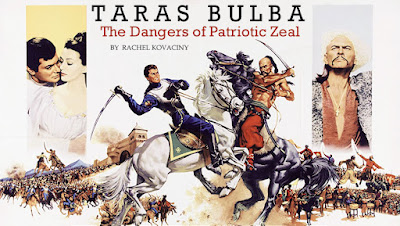In the film, the audience meets Taras Bulba (Yul Brynner) as a fierce, uncompromising Cossack. He and his fellow warriors assist their stronger Polish allies in defeating a band of Turkish invaders, only to have the Poles turn on the Cossacks and crush them. The Poles take over eastern Ukraine and force the Cossacks into hiding. Taras Bulba and his compatriots must cut off the scalplocks that mark them as Cossacks and take up peaceful occupations like farming. (SPOILERS from here onward.)
Taras Bulba fathers two sons, Andrei (Tony Curtis) and Ostap (Perry Lopez). He trains them in the Cossack ways of fighting, but eventually sends them to a Polish university in Kiev. Taras orders them to learn everything about the Polish so they can eventually overthrow them.
While in Kiev, Andrei falls in love with a Polish princess named Natalia (Christine Kaufmann). Theirs is a forbidden romance because neither of their families could accept a marriage between a Pole and a Ukrainian. When Natalia’s brother learns of their involvement, he accuses Andrei of compromising her virtue and tries to kill him to avenge her honor. Andrei and Ostap must flee for their lives after killing several Poles in the resulting melee. They hurry home where Taras decides his sons have grown up well and are ready to become true Cossacks.
The Polish army soon demands the Ukrainians raise a Cossack army to help them attack Turkey. Taras Bulba convinces the rest of the Zaparozhian Cossacks to attack the Poles and drive them out of the Ukrainian steppes for good. The Cossacks ride to the city of Dubno, attack and lay siege to it.
Guess who’s inside that city? Natalia. Which fills Andrei with conflicted feelings when plague breaks out in Dubno. He tries to sneak Natalia out, but wind up getting them both captured and imprisoned for daring to fall into such an unsuitable romance.
The Cossacks triumph. The Polish soldiers all either die or flee, and the Cossacks take over Dubno and vow to treat any remaining Poles with dignity, not the way the Poles used to treat them. It’s a rousing story of Ukrainian nationalism, forbidden romance, loyalty, and courage. But… is it factual?
There was a Cossack uprising within Polish-controlled Ukrainian lands in the mid-1600s. Sometimes called the Cossack-Polish War, it involved the Zaparozhian Cossacks. The war pushed the Polish out of eastern Ukraine. The Russian Tsar took control of eastern Ukraine with the agreement that the Cossacks were to remain largely self-governing.
Sadly, the Cossack-Polish War involved a lot of religious persecution against several minority groups. The Cossacks targeted both Roman Catholic priests and the Jews. By the end of the war, eastern Ukraine had become Orthodox. They forced Jewish landholders to give up their property and flee. So, while the Cossacks threw off their Polish oppressors, they turned around and oppressed other people.
Nikolai Gogol’s novel Taras Bulba contains anti-Semitic themes that, intentionally or not, reflect the wrongful treatment of Jewish people during this slice of history. The film removes that aspect of the story and concentrates on the forbidden love between Andrei and Natalia. It shows how the unreasonable racial hatred of their families results in nothing but misery and anguish. Taras Bulba is so enraged by what he considers betrayal by his son, he shoots and kills Andrei to protect the family honor. But, by the end of the film, he feels remorse over this honor-killing and behaves kindly toward Natalia and the other remaining Poles.
Taras Bulba is a fascinating look at where ultra-patriotic ideology can lead. Yes, it helped the Cossacks push the Polish out of the Ukrainian homeland. But it also caused a father to murder his own son. I think the filmmakers were trying to show that patriotism can be noble, but when pushed to fanatical extremes, it can be deadly. In our divisive modern world, where people get vehemently attached to one political ideology or another, that’s a lesson we need to remember.
(This post originally appeared in Femnista magazine on August 11, 2018.)





No comments:
Post a Comment
Agree or disagree? That is the question...
Comments on old posts are always welcome! Posts older than 7 days are on moderation to dissuade spambots, so if your comment doesn't show up right away, don't worry -- it will once I approve it.
(Rudeness and vulgar language will not be tolerated.)